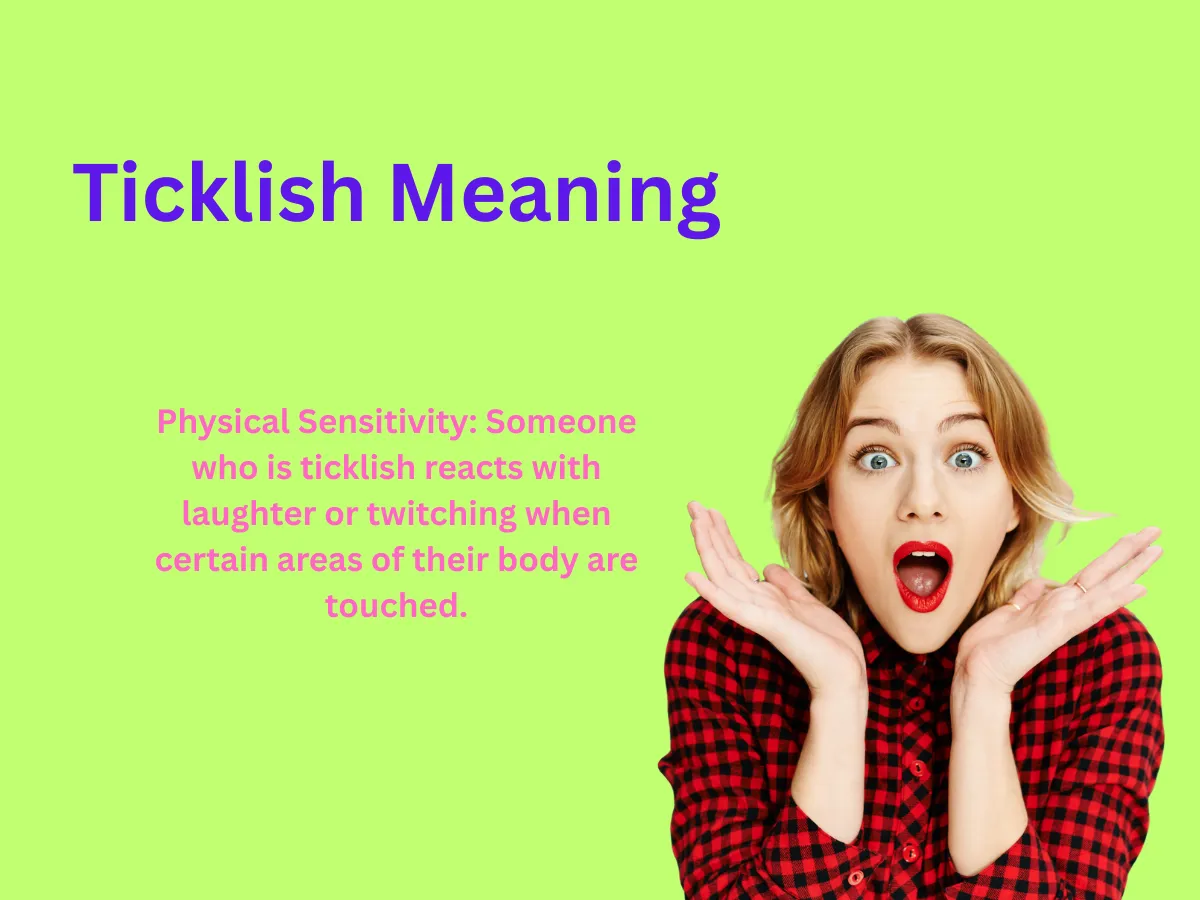Ever wondered why some moments make you giggle or flinch? Ticklish Meaning captures both the physical and emotional side of sensitivity. Ticklish usually refers to the physical sensitivity that causes laughter or discomfort when someone touches specific areas of the body. However, in modern slang and online conversations, ticklish can also describe emotional sensitivity, vulnerability, or situations that are delicate and hard to handle.
The term shows up in memes, funny social media posts, and even relationship jokes — often carrying both literal and metaphorical layers of meaning.
In this guide, we’ll explain the meaning of ticklish in slang, explore its origins, discuss different usage contexts, clear up common misconceptions, and share related terms and responses.
What Does Ticklish Mean in Slang?
In slang, ticklish can describe someone who’s easily affected — either physically, like being touched, or emotionally, like getting flustered or embarrassed easily. Online, it’s sometimes used jokingly to tease someone for being sensitive or shy in a cute way.
Example Sentences:
- “She’s super ticklish; don’t even try to poke her!”
- “He gets ticklish when people compliment him.”
- “That topic’s a bit ticklish — better change the subject.”
Key Points to Remember:
- Ticklish means sensitive, either physically or emotionally.
- Used in humor, relationships, or gentle teasing.
- Can also describe tricky or awkward situations.
- Common across casual, playful, or flirtatious conversations.
Background & History
The word ticklish comes from the Old English word tickle, meaning “to touch lightly to cause laughter.” Over time, it evolved to describe not only the physical reaction but also emotional delicacy.
In modern slang, ticklish appears in memes, comedy videos, and even romantic conversations — showing how one word can bridge humor and tenderness.
Usage in Various Contexts
1. Texting
Used playfully or teasingly between friends or partners.
A: “You’re ticklish, aren’t you?”
B: “Only when I trust you 😏”
2. Social Media
Appears in captions, memes, or jokes that mix humor and shyness.
- “Me: not ticklish. Also, me when someone touches my side 😭”
- “That’s a ticklish topic, don’t go there 😅”
3. Gaming
Used metaphorically to describe delicate strategies or sensitive reactions.
Player 1: “This level’s ticklish — one wrong move and you’re done.”
Player 2: “Yeah, handle it gently.”
4. Daily Conversations
Used both literally and figuratively.
Friend 1: “Why are you laughing?”
Friend 2: “Stop! I’m ticklish!”
Or:
Colleague 1: “That’s a ticklish subject for the meeting.”
Colleague 2: “Let’s tread carefully.”
5. Professional Settings
Refers to topics or situations that are sensitive or delicate — not physical ticklishness.
- “The merger discussion is ticklish — we should handle it carefully.”
Common Misconceptions & Clarifications
Misconception 1: Ticklish only means laughing when touched.
Reality: It can also mean emotionally or socially sensitive.
Misconception 2: It’s only used for kids or jokes.
Reality: In slang, adults use it to describe delicate or awkward moments too.
Misconception 3: It’s inappropriate or flirty only.
Reality: Context decides the tone — it can be innocent, funny, or emotional.
Similar Terms & Alternatives
| Term | Meaning | Example |
|---|---|---|
| Sensitive | Easily affected or emotional | “He’s a bit sensitive about that joke.” |
| Delicate | Needing careful handling | “That’s a delicate issue, don’t push it.” |
| Playful | Fun or teasing in nature | “They had a playful ticklish moment.” |
| Awkward | Uncomfortable or hard to discuss | “It got awkward when they mentioned it.” |
How to Respond to This Term
Casual Response:
- “Haha, same! I’m ticklish too 😂”
- “That made me laugh!”
Funny Response:
- “No tickling zone, please!”
- “I’m allergic to tickles 😎”
Professional Response:
- “Let’s approach that topic carefully.”
- “That’s a ticklish matter, but manageable.”
Regional or Cultural Differences
- Common in English-speaking countries worldwide.
- Used both literally and metaphorically in the U.S., U.K., and Canada.
- Some Asian and European regions use it mainly in its literal sense.
Hidden or Offensive Meanings
Generally, ticklish isn’t offensive. However, depending on tone or context, it can carry flirty or suggestive undertones, especially when used in physical or romantic conversations.
Suitability for Professional Communication
- Safe to use in a figurative or sensitive topic sense.
- Avoid using it in a physical or teasing context at work.
FAQs
What does “Ticklish” mean in slang?
It means being sensitive — physically, emotionally, or situationally.
Can it be used in casual conversation?
Yes, especially in jokes, relationships, or lighthearted chats.
Is it appropriate at work?
Yes, if used metaphorically (like “a ticklish issue”).
Is it always flirty or physical?
No, context determines tone — it can be innocent or emotional.
Are there synonyms?
Yes: sensitive, delicate, playful, and awkward.
Conclusion
In short, ticklish describes both physical sensitivity and emotional delicacy, depending on how it’s used. From laughter-inducing touches to describing fragile moments, it’s a word that bridges humor, connection, and care.
Understanding ticklish meaning helps you interpret tone correctly — whether it’s used in a playful chat, a romantic tease, or a careful professional discussion.

